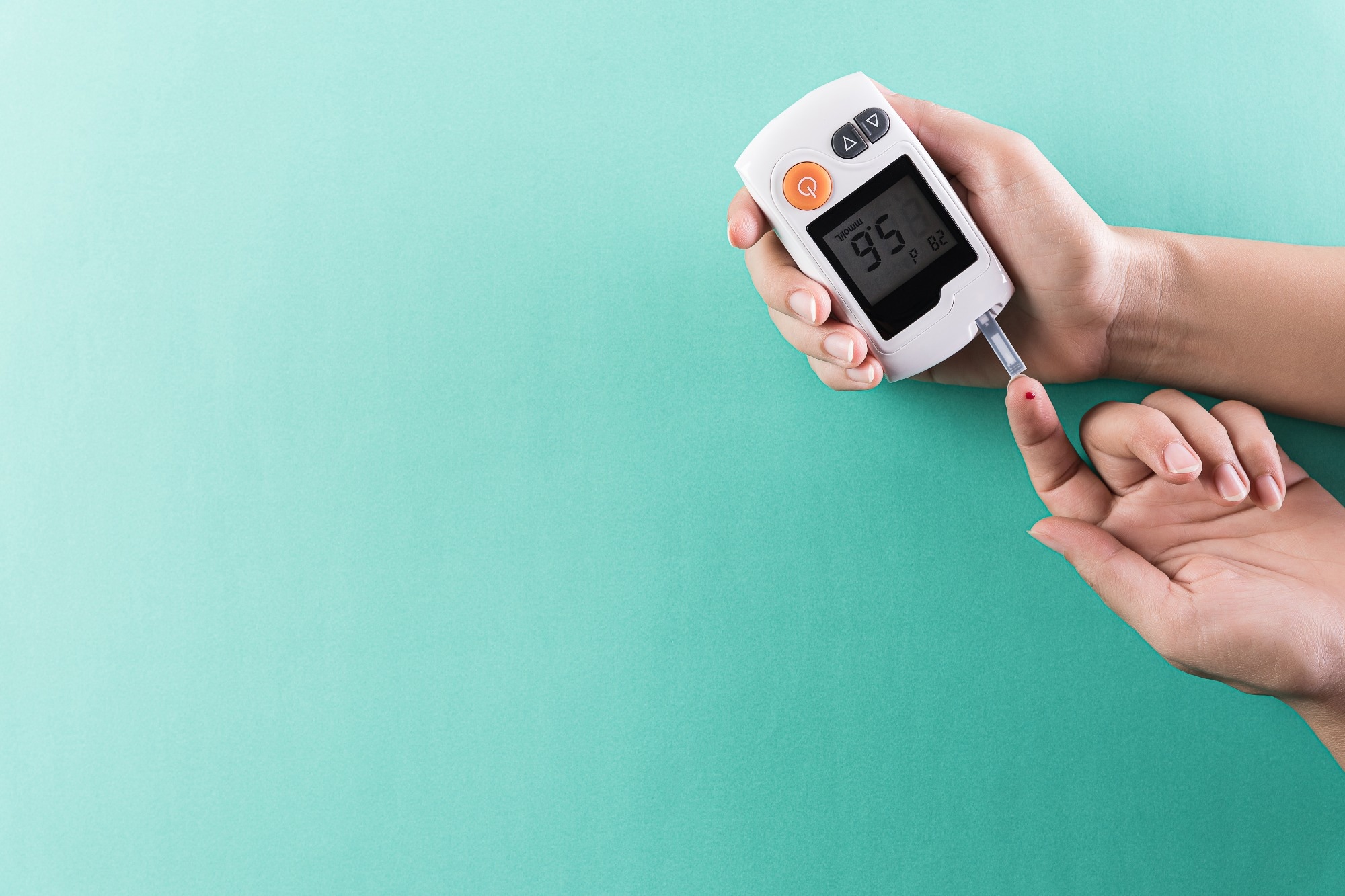Most circulating vitamin D forms in the skin from 7-dehydrocholesterol in sunlight and are subsequently converted into 25-hydroxyvitamin D [25(OH)D] and 1,25-dihydroxy vitamin D [1,25(OH)2D] in the liver and kidney, respectively. While 25(OH)D is a biomarker for vitamin D levels and its primary circulating form, 1,25(OH)2D is the active metabolic form.
 Study: Vitamin D in Diabetes: Uncovering the Sunshine Hormone’s Role in Glucose Metabolism and Beyond. Image Credit: siam_pukkato / Shutterstock.com
Study: Vitamin D in Diabetes: Uncovering the Sunshine Hormone’s Role in Glucose Metabolism and Beyond. Image Credit: siam_pukkato / Shutterstock.com
Islet dysfunction and vitamin D
T2D is characterized by insulin resistance in peripheral organs and reduced insulin secretion from pancreatic islets, which cause hyperglycemia and glucose intolerance. Studies in rats suggest deficient vitamin D levels in vivo lead to decreased serum insulin and impaired insulin secretion from isolated islets.
Numerous studies have demonstrated that supplementing deficient mice with vitamin D could restore insulin secretion from islets, thereby suggesting a regulatory role of vitamin D. Moreover, the expression of serum insulin is significantly reduced in vitamin D receptor (VDR)-mutant mice, which indicates that VDR regulates genes involved in insulin expression/secretion.
In humans, clinical studies have corroborated vitamin D function in β cells in pre-diabetic, non-diabetic, and T2D individuals. However, whether vitamin D treatment in humans could directly improve insulin secretion remains unclear.
Islet dysfunction in T2D occurs due to a combination of stress factors such as inflammation, glucolipotoxicity, islet amyloid polypeptide (IAPP) toxicity, and endoplasmic reticulum (ER) stress.
Vitamin D or VDR overexpression has been shown to suppress pro-inflammatory responses and apoptosis in islets and β cell lines. Vitamin D can also actively suppress IAPP-induced β cell function and ER stress.
One study reported that VDR overexpression in islets rescued islet dysfunction in mice, thereby suggesting that supraphysiological activation might be necessary for functional improvement.
Insulin resistance
Insulin resistance is a hallmark of T2D and prediabetes. Vitamin D has been shown to regulate insulin sensitivity in peripheral metabolic organs and cell lines.
In vitro, 1,25(OH)2D activates VDR to increase the expression of insulin receptors, subsequently increasing insulin sensitivity. Additional evidence suggests a protective role of vitamin D in the skeletal muscle against insulin resistance.
It remains unknown whether vitamin D regulates insulin receptor expression in adipose tissue and the liver.
T2D and vitamin D deficiency
Vitamin D deficiency is associated with insulin resistance, islet dysfunction, and an increased incidence of T2D. Importantly, studies involving vitamin D supplementation as preventive or interventional therapy for T2D have offer mixed results.
Nevertheless, one cross-sectional study observed a negative association between BMI and serum levels of 25(OH)D during winter. Another study showed an association between low plasma levels of 25(OH)D and increased T2D risk.
One meta-analysis showed a monotonic association between higher levels of 25(OH)D and reduced diabetes risk, with a 10 nmol/L increase in serum levels of 25(OH)D correlating with a 4% decrease in T2D incidence.
A randomized controlled trial with 96 non-diabetic subjects indicated the beneficial effect of supplementing vitamin D3 on insulin sensitivity after six months. Studies have also reported improvements in homeostatic model assessment for insulin resistance (HOMA-IR), insulin, body weight, and fasting plasma glucose in T2D patients after vitamin D treatment.
Vitamin D and T1D
T1D occurs due to the autoimmune destruction of β cells in the pancreas that leads to insulin deficiency. Epidemiologic studies and animal models corroborate the ability/role of vitamin D in preventing T1D pathogenesis.
One birth cohort study observed a significant decrease in T1D risk in children receiving daily vitamin D. Furthermore. another study reported a correlation between lower maternal levels of 25(OH)D in pregnancy and increased risk of T1D onset in childhood.
One previous study showed that supplementing vitamin D in early childhood prevented T1D development. Although evidence from healthy individuals is promising, limited studies support the role of vitamin D in delaying T1D.
Vitamin D3 supplementation, as adjunctive therapy with insulin, has been shown to limit the decline in residual β cell function in patients with new-onset T1D. However, two studies observed no protective effect of 1,25(OH)2D3 treatment in those with new-onset T1D.
Conclusions
Vitamin D modulates insulin secretion/action in diabetes. VDR and vitamin D directly regulate functional genes, including those involved in insulin activity.
Vitamin D can act on tissue-resident immune cells and reduce inflammation, thereby preventing islet dysfunction. Vitamin D deficiency is linked to a higher T2D incidence; therefore, restoring vitamin D levels in deficient subjects can slow T2D progression.
The benefit of vitamin D supplements in ameliorating T2D has not been observed in large clinical trials. Thus, extensive trials are needed to evaluate whether vitamin D intake can prevent or reverse T2D.
Journal reference:
- Wu, J., Atkins, A., Downes, M., & Wei, Z. (2023). Vitamin D in Diabetes: Uncovering the Sunshine Hormone’s Role in Glucose Metabolism and Beyond. Nutrients. doi:10.3390/nu15081997